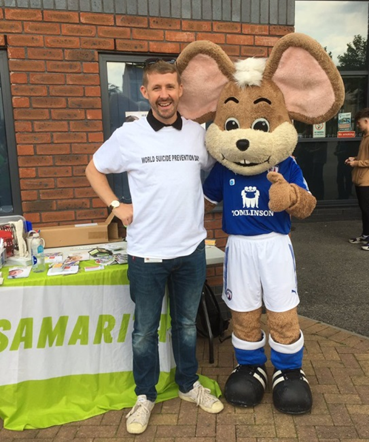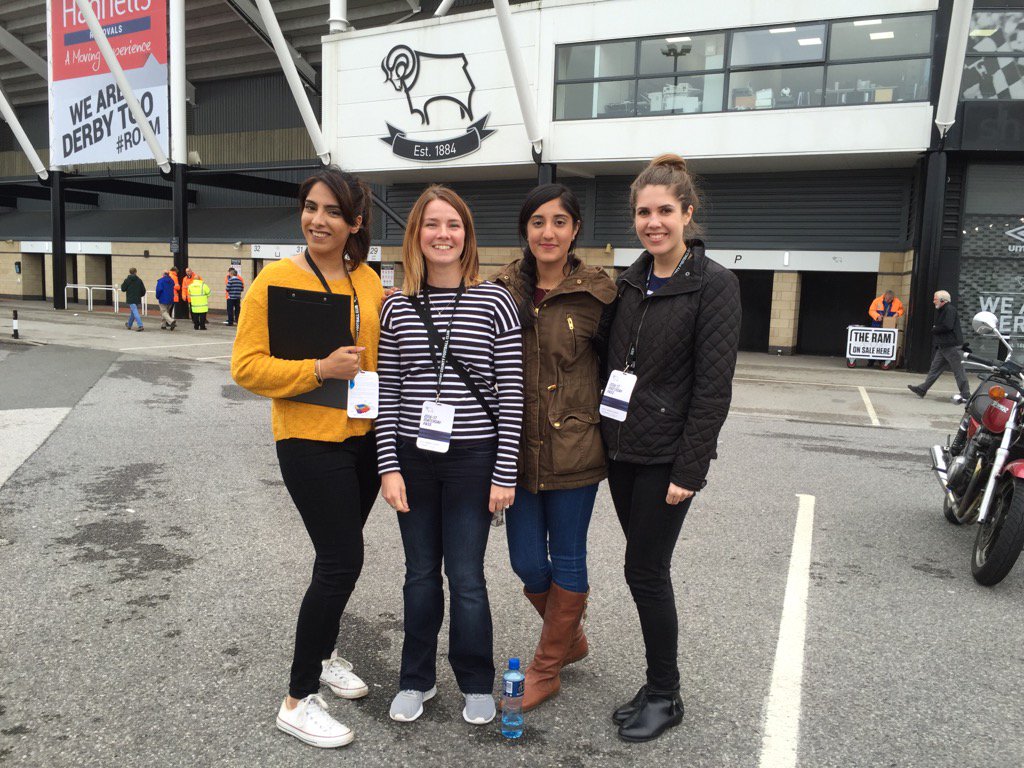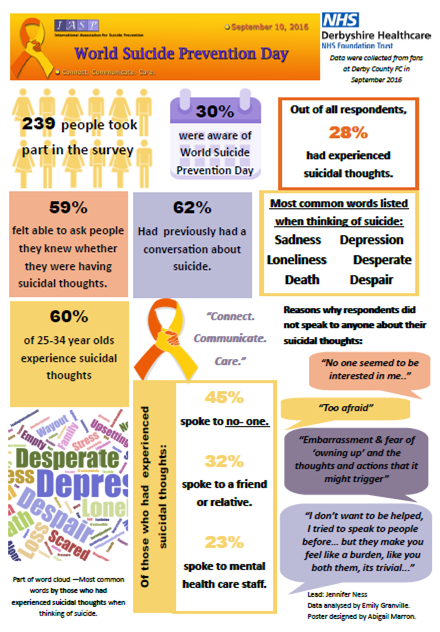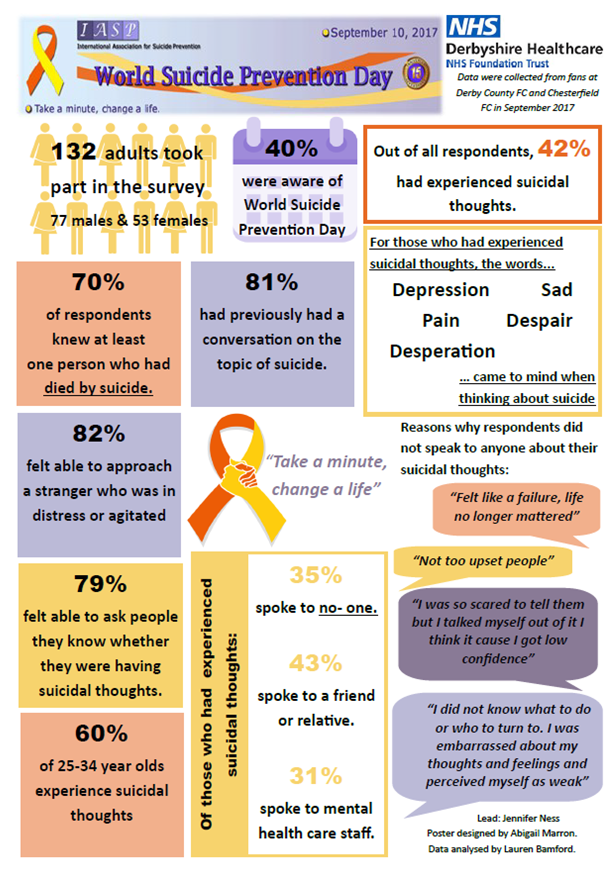 Derbyshire Healthcare NHS Foundation Trust has proudly supported the International Association for Suicide Prevention's World Suicide Prevention Day (WSPD) since 2016. The event takes place on 10 September every year. It aims to raise awareness of suicide – specifically in groups who otherwise may not discuss the topic.
Derbyshire Healthcare NHS Foundation Trust has proudly supported the International Association for Suicide Prevention's World Suicide Prevention Day (WSPD) since 2016. The event takes place on 10 September every year. It aims to raise awareness of suicide – specifically in groups who otherwise may not discuss the topic.
The Trust’s support for WSPD is in line with our Suicide Prevention Strategy which aims to help reduce the risk and incidences of suicide. The strategy sets out aims in line with the Trust’s vision - to make suicide prevention everyone’s business - by raising awareness, working with others and most importantly by listening.
The aims of our Suicide Prevention Strategy are to…
- Reduce the risk of suicide in key high-risk groups
- Tailor approaches to improve mental health in specific groups
- Reduce access to means of suicide
- Provide better information and support to those bereaved or affected by suicide
- Support the media in delivering sensitive approaches to suicide and suicidal behaviour
- Support research, data collection and monitoring
- Build the resilience of local communities to prevent and respond to suicides.
Trust volunteers have attended a number of football matches in September each year:
- 2016 ‘Connect. Communicate. Care’ event at Derby County FC
- 2017 ‘Take a minute, change a life’ events at Derby County FC and Chesterfield FC
- 2018 ‘Working together to prevent suicide’ events at Derby County FC, Chesterfield FC, Alfreton FC and Belper Town FC.
Volunteers spoke to fans before the matches about suicide and suicidal thoughts. They also handed out cards containing information and contact numbers for suicide support lines.

Contact cards given to fans at Derby County FC and Chesterfield FC
As part of the day, a survey is given out to gather information from the public regarding their attitudes and experiences of suicide and suicidal thoughts.
Below are infographics showing the results for recent years.
The survey was completed by a total of 371 people. Of these, 37% were aware it was WSPD and 66% had previously had a conversation about suicide.
29% of those asked had experienced suicidal thoughts. Of those, 38% spoke to a friend or relative about their thoughts, 28% to their GP staff and 37% to mental health staff. 34% spoke to no-one about their suicidal thoughts.
66% felt they would be able to ask someone they knew if they were having suicidal thoughts.
In 2017, 68% of people knew someone who had died by suicide, and 80% felt able to approach a stranger who seemed distressed.
WSPD 2016 survey results
- 239 people took part in the survey
- 30% were aware of World Suicide Prevention Day
- out of all respondents 28% had experienced suicidal thoughts
- 59% felt able to ask people they knew whether they were having suicidal thoughts
- 62% had previously had a conversation about suicide
- Most common words listed when thinking of suicide: sadness, depression, loneliness, desperate, death and despair
- 60% of 25-34 year olds experience suicidal thoughts
- Of those who experienced suicidal thoughts: 45% spoke to no one, 32% spoke to a friend or relative, 23% spoke to mental health care staff
- Reasons why respondents did not speak to anyoneabout their suicidal thoughts: "no one seemed interested in me", "too afraid", "embarrassment and fear of "owning up" and the thoughts and actions that it might trigger", "I don't want to be helped, I tried to speak to people before... but they make you feel like a burden, like you both them, it's trivial."
WSPD 2017 survey results
- 132 adults took part in the survey (77 males and 53 females)
- 40% were aware of World Suicide Prevention Day
- Out of all respondents, 42% had experienced suicidal thoughts
- 70% of respondents knew at least one person who had died by suicide
- 81% had previously had a conversation on the topic of suicide
- Most common words listed when thinking of suicide: sad, pain, depression, desperation and despair
- 82% felt able to approach a stranger who was in distress or agitated
- 79% felt able to ask people they know whether they were having suicidal thoughts
- 60% of 25-34 year olds experience suicidal thoughts
- Of those who experienced suicidal thoughts: 35% spoke to no one, 43% spoke to a friend or relative, 31% spoke to mental health care staff
- Reasons why respondents did not speak to anyoneabout their suicidal thoughts: "I felt like a failure, life no longer mattered.", "not to upset people", "I was so scared to tell them but I talked myself out of it I think it's cause I got low confidence", "I did not know what to do or who to turn to. I was embarrassed about my thoughts and feelings and perceived myself as weak"
Partners in recent years have included:
- Samaritans
- Cruse
- Derby County Community Trust
- Chesterfield FC Community Trust
- Derbyshire County Council
- Derby County Council
- National Suicide Prevention Alliance.
Derbyshire Healthcare consultant psychiatrist Dr Allan Johnston, State of Mind's Jimmy Gittins and local author Kalwinder Singh Dhindsa at WSPD 2016.
Dr Allan Johnston with Chesterfield FC's mascot on WSPD 2017.

Volunteers from Derbyshire Healthcare, Derbyshire County Council and other organisations at Alfreton Town FC for WSPD 2018.
The Trust’s Research team at Derby County FC for WSPD 2016.

The Centre for Self-harm and Suicide Prevention Research team are unable to provide a treatment service or advice for those in crisis. If you are in crisis or feeling suicidal we urge you to seek help from your GP, through a telephone helpline service such as Samaritans (UK telephone number 116 123 free from a mobile or landline), or by discussing your problems with a friend or colleague. For more information for Derby and Derbyshire, visit our help in a mental health crisis page. Befrienders Worldwide offers a comprehensive directory of crisis helplines worldwide. We are also not able to discuss individual cases.



